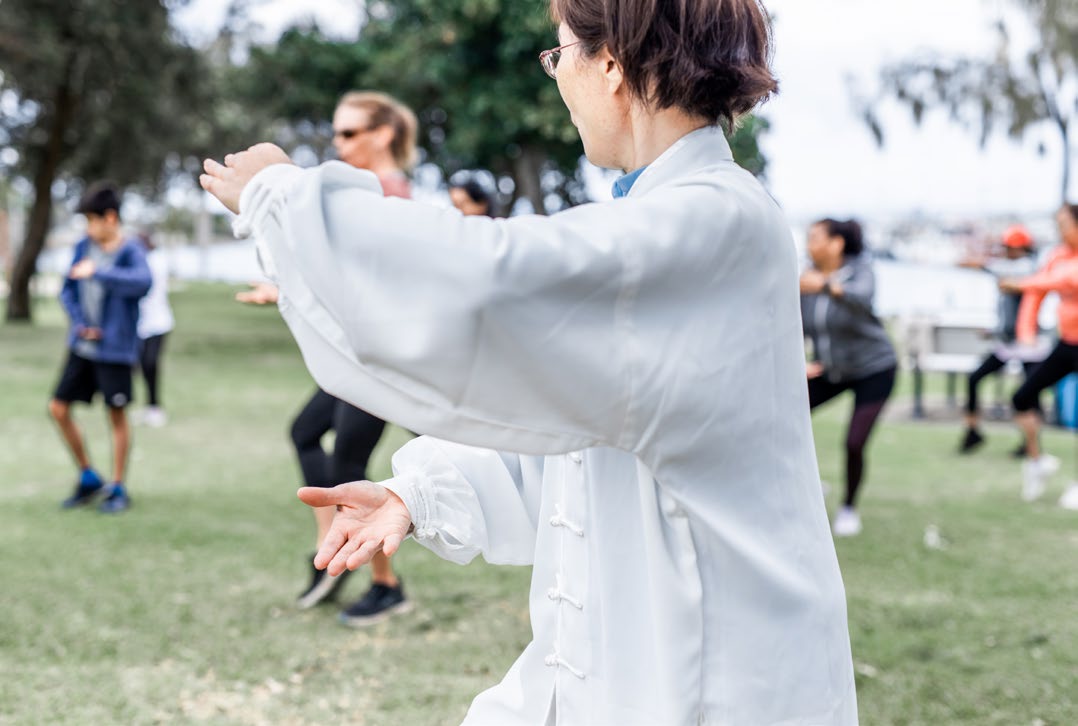
Managing Chronic Conditions and Preventing Falls
DOWNLOADJune 7, 2022 - Becky McKendry, Michigan State University Extension
Impacts
As a result of MSU Extension’s disease management and falls prevention programming, 1,170 participants learned to: prevent and manage their chronic health conditions, prevent falls through increased physical activity, improve communication with their healthcare provider and increase their knowledge of healthy eating. Of participants surveyed:
- 89% of Dining With Diabetes participants are now eating smaller portions after taking the class.
- 73% of Personal Action Toward Health (PATH) program participants increased or maintained their confidence in keeping physical discomfort or pain from interfering with the things they want to do.
- 100% of Tai Chi and A Matter of Balance participants reported feeling more comfortable increasing their physical activity as a result of attending the classes.
- 859 people participated in MSU Extension's disease prevention and management programs in 2021.
- 311 people participated in MSU Extension's falls prevention programs in 2021.
Priority Areas
- Helping prevent and manage diabetes and other chronic health conditions.
- Improving quality of life and sleep health.
- Boosting self-confidence to handle chronic health symptoms and pain.
- Increasing knowledge of healthy food choices.
- Increasing physical activity and reducing falls.
- Increasing partnerships with tribal communities and health care organizations to offer evidence based health programs.
"I have felt healing from the range of motion utilized while engaging in the Tai Chi movements since participating. The moves are so slow, deliberate and concentrated. I have shared this information with some of my friends in hopes they will also gain strength and balance using Tai Chi in their daily lives." Participant in Tai Chi for Arthritis and Fall Prevention
To support programming on managing chronic conditions and preventing falls, contact Cheryl Eschbach (cheryl@msu.edu). To bring this programming to your community, contact Charlee Brissette (brisse14@msu.edu), Dawn Contreras (contrer7@msu.edu), Christi Demitz (demitzch@msu.edu), Naomi Hyso (hysonaom@msu.edu) or Liz Williams (josaitis@msu.edu).

Preventing Falls With Evidence-Based Education
One in four older adults will report a fall this year. Falls and the fear of falling can negatively affect people’s quality of life by causing physical, social and emotional decline. MSU Extension offers two evidence-based falls prevention classes. Tai Chi for Arthritis and Falls Prevention is a nine-week (18 session) class that combines slow, gentle movement with deep breathing and focused intention to help participants improve strength, balance and posture. A Matter of Balance is an eight-session class that helps participants increase their physical activity, reduce their fear of falling and remove fall hazards in the home environment.
In 2021, 311 individuals participated in MSU Extension’s falls prevention educational programming. Most participants were age 60 and up (84%), female (90%) and white (95%). Seventy-two percent of participants reported having multiple chronic conditions.
Tai Chi and falls prevention instructors often report just as rewarding an experience as the class participants themselves. As one instructor reported, “This was my first-time teaching Tai Chi in person, and it was such a great success! I had 20 participants register and [almost all] of them graduated from the program. Each week, they were getting more and more confident with the forms and movements and seeing the progression of the class was amazing. They immediately asked when we could start our next class. In particular, there was one gentleman who has Parkinson’s disease in my class. He came up to me after class and told me, ‘I may not have my feet facing the same way, but I have seen a change in my balance from taking this class’!”
Promoting Covid-19 Vaccine Acceptability in Tribal Communities
In 2021, MSU Extension received a grant from the Extension Foundation’s national EXCITE (Extension Collaborative on Immunization Teaching and Engagement) project. The long-term goal of this funding is to strengthen immunization education with a special focus on adult vaccination hesitancy around both COVID-19 and other adult immunizations. The immediate goal is to promote the increase of COVID-19 vaccinations through relevant messaging and innovative models for community action. MSU Extension chose to focus the outreach effort on selected tribal nations and communities. The organization partners with two other land-grant colleges in Michigan: Bay Mills Community College and Keweenaw Bay Ojibwa Community College.
The EXCITE project combines outreach strategies and events to increase vaccine acceptability in areas that are

central to these project partners: Bay Mills Indian Community and the Keweenaw Bay Indian Community. Project staff are implementing key strategies from a communication plan, primarily outreach via advertisements, social media, mailings, videos, newspapers, and radio. The project uses communications materials from Michigan Department of Health and Human Services, the Centers for Disease Control and Prevention and the Urban Indian Health Institute.
EXCITE project staff presented at the Bay Mills Indian Community Powwow in August 2021 about the COVID-19 vaccine and the benefits of being vaccinated. In November, they coordinated a ribbon skirt workshop to share traditional knowledge about how to create ribbon skirts, why ribbon skirts are worn and other teachings. At this tribal community event, the staff also shared COVID-19 vaccination education.
The project has continued into spring 2022 and the project partners are tailoring their efforts to reach tribal communities with videos, magnets, care packages and other outreach items that promote COVID-19 vaccinations.
Sleep Education for Everyone Program

Getting a good night’s sleep is important for our health and well-being. The Sleep Education for Everyone Program, or SLEEP, is designed to help people of all ages get more and better sleep. During the program’s six 30-minute sessions, participants learn about these topics:
- What is high-quality sleep
- Why high-quality sleep is important
- How long to sleep
- Sleep hygiene
- Stimulus control therapy for chronic insomnia
- Mindfulness and relaxation
- The relationship between sleep and physical activity
- Sleep myths
SLEEP was developed in 2021 by sleep researchers, a certified sleep medicine specialist, Michigan State University Extension educators and older adults. Six MSU Extension educators were trained to deliver SLEEP virtually and reached 114 participants in 2021. The program’s success led to SLEEP becoming part of MSU Extension’s core health programming.
A new project is supported from a grant awarded through the MSU Department of Family Medicine to partner with Spectrum Health System to integrate referrals to MSU Extension-delivered SLEEP programming. This integration will make it easier for primary care providers to refer patients to SLEEP.
Dining With Diabetes
About one in ten Michiganders age 18 or older is living with diabetes. Diabetes is more prevalent among Black, non- Hispanic adults (14.6%) than among white, non-Hispanic adults (10.9%). MSU Extension’s Dining With Diabetes program series can help those living with the condition, those trying to prevent it, and the friends and family members supporting them.
Dining With Diabetes is a multi-session series conducted by MSU Extension and community health partners, where participants can explore and taste foods prepared from diabetes-friendly recipes. The Dining With Diabetes program is offered exclusively by state Cooperative Extension services. This hands-on interactive program helps people with prediabetes, type 1 or type 2 diabetes, and members of their support systems learn cooking skills and strategies to better manage, prevent or delay diabetes and related complications. A self-paced, online version of the Dining With Diabetes program is also in development, with plans to launch it in 2022.
Dining With Diabetes participants often report they have improved their health habits, such as reducing portion sizes and choosing healthier recipes, after taking the series. As one participant said, “I learned quite a bit. I check my sugar more often and I feel a lot better . . . I try to eat only healthy [and] I drink more water.”
- 114 people participated in the Sleep Education for Everyone Program (SLEEP) in 2021.
- 245 people participated in PATH programs in 2021.
- 450 people in tribal communities were reached with COVID-19 vaccination education materials and cultural programming.
Connecting Patients to Community-Based Education
Part of transforming healthcare is to help patients engage in prevention strategies and learn self-management activities related to maintaining and improving their health. Community-based education, especially programs that help people take control of their health, enhance their daily lives and improve how they manage chronic symptoms such as pain. Referrals from physicians for patients to seek health and wellness educational programs in their community can also help address social determinants of health. Social determinants of health are the factors within our environments (where we live, work, and play) that can affect our health and health outcomes.
From 2014 to 2019, healthcare providers and MSU Extension educators used a paper-based tool called the “Rx for Health Referral Toolkit and Pad.” This tool helped increase patients’ awareness and use of MSU Extension’s free and low-cost community-based health education programs. Rx for Health was designed to help healthcare providers build or maintain a patient-centered medical home model of care, or PCMH. Under this healthcare model, patients must be referred to community and social services.
In 2020, MSU Extension began moving to an electronic referral system to increase referrals. In 2021, MSU Extension began participating in a new, easier healthcare referral program for our free, online health classes. ReferralsPlus™ is a secure online portal that allows providers to send referrals throughout Michigan. (The system was formerly called “Great Lakes Health Connect.”)
Healthcare providers can now send referrals to MSU Extension classes through ReferralsPlus™ using the tag “MSU Extension.” Patient referrals are being accepted for the following MSU Extension self-management programs for chronic disease, diabetes and chronic pain: Stress Less With Mindfulness, RELAX: Alternatives to Anger, and PATH (Personal Action Toward Health).
- 98% of participants in Tai Chi for Arthritis and Falls Prevention and A Matter of Balance participants reported feeling more satisfied with life.
- 72% of Dining with Diabetes participants are now using recipes they learned from the program.



 Print
Print Email
Email



